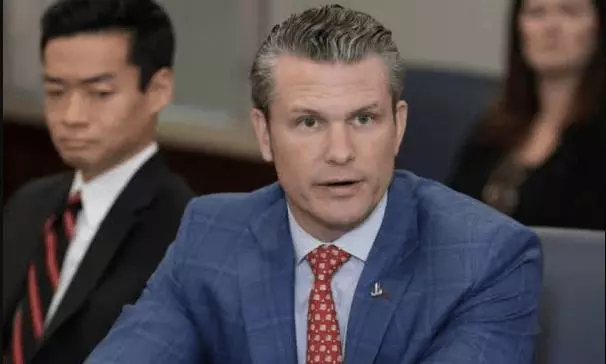
China poses ‘imminent’ threat to Taiwan, warns US Defence Secretary
Speaking at the Shangri-la Dialogue in Singapore, Pete Hegseth urged Asian countries, including India, to boost their defence spending and work with the US to deter war in the Indo-Pacific

The US Defence Secretary Pete Hegseth has asked for renewed cooperation between the US and Asian nations, including India, saying that China poses an ‘imminent’ threat to Taiwan.
Speaking at the Shangri-la Dialogue in Singapore, which attracts some of Asia’s most influential politicians, military officials, and geopolitical analysts, he urged the Asian countries to boost their defence spending and work with the US to deter war.
Also read: Is Musk really leaving US govt? Here is what Trump said at his farewell
The Shangri-la Dialogue has traditionally served as a platform for the US and China to make their pitches to Asian countries as the superpowers jostle for influence.
He stressed that the Indo-Pacific remained America’s top priority, while emphasising that key partners like India would be most important to keep the conflict in check.
He explained that India would be an important cog in the US’s push to defend Taiwan, and control Chinese hegemony, saying that India is a valuable partner that has done several deals and cooperation mechanisms with the US.
India’s support
Outlining plans for closer cooperation with regional partners, including India, Hegseth said, “We will continue to wrap our arms around our friends and find new ways to work together. Not only our treaty allies, but also our key defence partners in Association of Southeast Asian Nations (ASEAN) and across the Indo-Pacific. For example, look no further than to our growing defence relationship with India, where we pass new milestones by the day — from shared ventures of our defence industries to the increased operational coordination and interoperability between our two militaries.”
He also mentioned the continuous work done between US and India on autonomous systems.
But at the end of the day, Hegseth emphasised that Asian countries do their part, increase defence spending and help the US defend the Indo-Pacific region from Chinese hegemony.
‘Will not be intimidated’
While the US does not "seek to dominate or strangle China", it would not be pushed out of Asia nor allow its allies to be intimidated, Hegseth said.
He said Beijing was "credibly preparing to potentially use military force to alter the balance of power" in Asia, and referred to a 2027 deadline that President Xi Jinping has allegedly given for China's military to be capable of invading Taiwan.
Also read: Trump warns China, says he will stop being 'nice'
China "is building the military needed to do it, training for it, every day and rehearsing for the real deal", Hegseth said.
He also forcefully remarked that the US does not seek war with China, “..but we must ensure that China cannot dominate us or our allies and partners," he said, adding "we will not be pushed out of this critical region".
China reacts
In response, the Chinese embassy in Singapore posted a note on its Facebook page saying the speech was "steeped in provocations and instigation", and added that the US was the primary troublemaker, nudging itself into regional issues that does not concern it.
Examples it cited included the US "deploying offensive weapons" in the South China Sea and conducting reconnaissance of what the embassy called "Chinese islands and reefs".
Ramp up defence spending
To prevent war, the US wants "a strong shield of deterrence" forged with allies, said Hegseth, who promised the US would "continue to wrap our arms around our friends and find new ways to work together".
But he stressed "deterrence does not come cheap" and urged Asian countries to ramp up their defence spending, pointing to Europe as an example.
Also read: US averted Indo-Pak nuke war: Trump repeats ceasefire claim
US President Donald Trump had already put forward his demand for Western allies and members of the North Atlantic Treaty Organization (NATO), to increase their defence spending to at least 5 per cent of their GDP.
This has allowed Hegseth to ask the Asian partners to do the same, saying, "How can it make sense for countries in Europe to do that while key allies and partners in Asia spend less in the face of a more formidable threat?" he said regarding China.
No economic ties with China
Hegseth also went on to warn Asian countries against seeking economic ties with China, saying Beijing would use it as "leverage" to deepen its "malign influence", complicating US defence decisions.
Also read: Trump visa clampdown threatens US-China academic ties
China's response criticised the US's approach to Europe, saying "The US keeps expanding its already staggering defence expenditure. Will the expanded portion come from tariffs it imposes on other countries?" referring to Trump's global tariffs, which have shaken up the world economic order and sparked concern among US allies.

